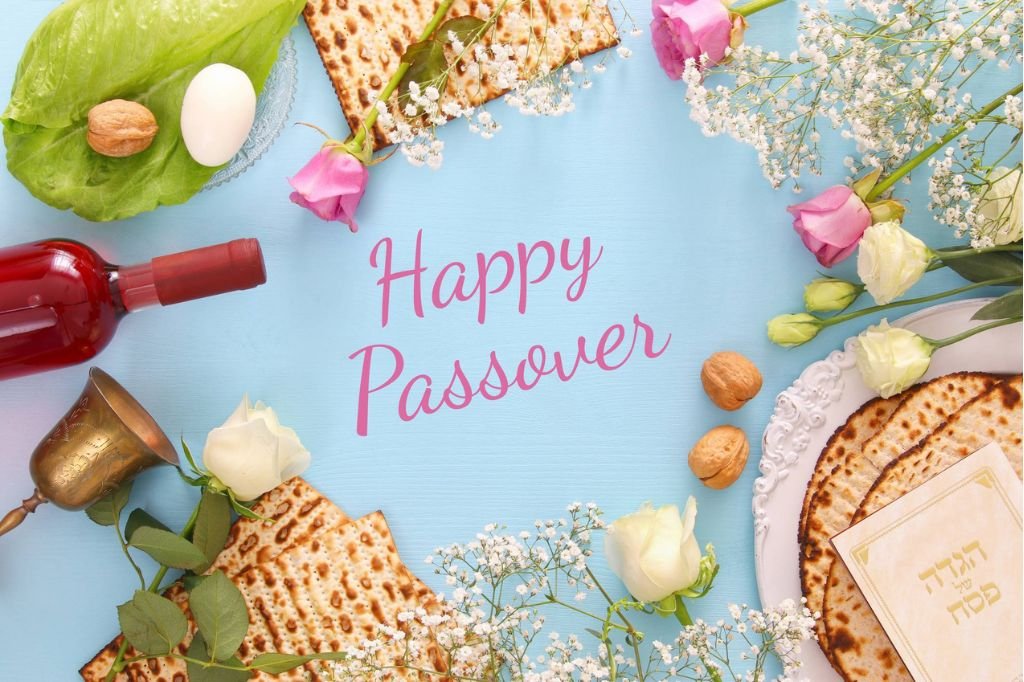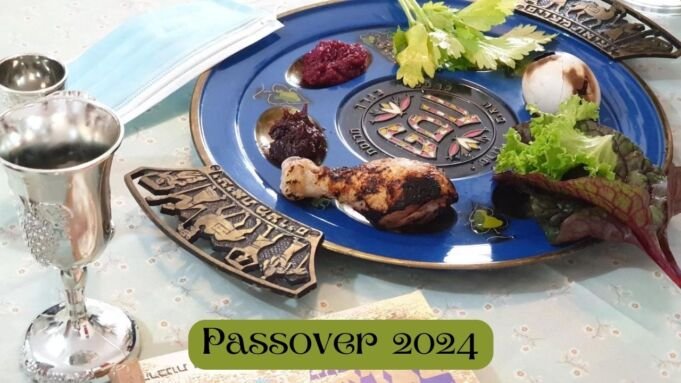Passover, or Pesach in Hebrew, is one of the most sacred and widely observed Jewish holidays. It commemorates the biblical story of Exodus, where God delivered the Israelites from slavery in Egypt under the leadership of Moses. This event is pivotal, symbolizing not just physical liberation but also spiritual redemption. The holiday lasts for seven days in Israel and eight days in the diaspora, starting with a ceremonial meal called the Seder, which means “order” in Hebrew, due to the specific sequence of the meal and rituals performed.
Passover 2024 will begin at sundown on Friday, April 22nd, and end at nightfall on Saturday, April 30th. These dates mark not only a time for remembrance but also a period for the Jewish community worldwide to engage in age-old traditions that have been preserved across generations.
What Is Passover?
The festival of Pesach, known in English as Passover, is a yearly celebration lasting a week that honors the liberation of the Jewish people from bondage (in ancient Egypt). The term “Pesach” in Hebrew translates to “to pass over,” referring to the event where the plague that took the lives of all firstborns in Egypt skipped the homes of the Israelites, thus preserving the lives of their offspring.
Passover 2024 Dates and Times
Passover 2024 will start on the evening of April 22nd and conclude on the evening of April 30th. The first Seder night, when the story of Exodus is retold, and the ceremonial meal is eaten, will be on April 22nd. The second Seder, observed by those outside of Israel, takes place on the following night, April 23rd. These Seder nights are the focal points of celebration, bringing families and communities together to recount the historical journey of the Israelites and reflect on the themes of freedom and redemption.
| Year | Passover Begins | Passover Ends |
| 2024 | Monday, April 22 | Tuesday, April 30 |
| 2025 | Saturday, April 12 | Sunday, April 20 |
| 2026 | Wednesday, April 1 | Thursday, April 9 |
| 2027 | Wednesday, April 21 | Thursday, April 29 |
Passover Themes and Reflections
Passover is a festival rich in themes of freedom, redemption, and renewal, reflecting not only historical deliverance but also personal and communal transformation. It invites reflection on the nature of bondage and the value of liberty, both in the ancient context and in our lives today. The story of Exodus prompts us to consider what it means to be free and how we can contribute to the liberation of others. It’s a time to contemplate renewal, both of the spirit and of our commitment to our values and beliefs.
Ideas for Incorporating Discussions on Contemporary Issues of Freedom and Justice into Your Seder
- Modern-Day Exodus Stories: Share stories or news articles about current struggles for freedom and justice around the world, drawing parallels to the Exodus story.
- Freedom Plate: In addition to the traditional Seder plate, create a “freedom plate” featuring symbols of modern-day struggles for liberation and rights.
- Discussion Questions: Prepare a set of questions that relate Passover themes to contemporary issues, such as immigration, racial justice, and religious freedom, to spark thoughtful discussion.
Read More: Perfect Jewish Gifts for The Holidays
How To Wish Someone “Happy Passover”?

To convey “Happy Passover” wishes, the Hebrew expression is “Pesach Sameach” (pronounced PEH-sakh sah-MAY-akh), where “Pesach” stands for “Passover” and “Sameach” translates to “happy.” For a general festive greeting applicable to any Jewish celebration, you can say “Chag Sameach” (KHAG sah-MAY-akh), which means “happy holiday” or “happy festival.”
It’s not necessary to be fluent in Hebrew or Yiddish to offer warm Passover greetings. In English, expressions like Happy Passover, Happy Holiday, Joyous Passover, or Blessed Passover are all suitable ways to wish someone well during the holiday.
How Is the Date of Passover Determined Each Year?
The determination of Passover’s date each year is anchored in the Hebrew lunar calendar. It is observed on the 14th night of Nisan, the inaugural month in the Jewish calendar. This timing is also rooted in biblical scripture, particularly in Exodus 12:1–14, where God instructs the Israelites to commemorate Passover starting from the 14th evening of the first month.
In terms of the Gregorian calendar, Passover’s dates shift approximately 11 days earlier each year, within the bounds of a lunar cycle, ensuring its observance in late March or April.
The onset of Passover aligns with the full moon, initiated by the Hebrew calendar’s practice of marking new months with new moons. To adhere to Rabbinic tradition, which mandates that Passover must follow the spring equinox, adjustments are made to account for the Hebrew calendar’s slight annual advance. This results in Passover being celebrated on the first full moon after March 25th.
Unique Considerations for Passover 2024
Calendar Peculiarities
Passover 2024 presents no unusual calendar peculiarities, following the traditional observance from April 22nd to May 1st. However, it’s always wise to note the exact timing of holiday commencements, as these can vary by location due to differences in sunset times.
Special Events or Gatherings
Jewish communities worldwide are planning an array of special events for Passover 2024, from larger communal Seders to educational workshops that delve into the holiday’s themes. Many communities are emphasizing eco-friendly and sustainable practices in their Passover celebrations, reflecting a growing consciousness around environmental issues.
Preparing for Passover
The preparation for Passover involves a thorough cleansing of the home to remove chametz, or leavened products, which are forbidden during the holiday. This custom symbolizes the Israelites leaving Egypt in haste, without time for their bread to rise. To prepare, start cleaning weeks in advance, checking corners, cupboards, and common areas for crumbs or forgotten food items. The night before Passover, a ceremonial search for chametz, called Bedikat Chametz, is performed using a candle, spoon, and feather, symbolically removing any remaining leavened products.
Read Also: Regatta De Zamboanga Festival
Seder Night Traditions
The Seder plate is a focal point of the Passover Seder, each item symbolizing aspects of the Exodus story:
- Matzah: Represents the haste in which the Israelites fled Egypt, without time for their bread to rise.
- Maror (Bitter Herbs): Symbolizes the bitterness of slavery.
- Charoset: A mixture of apples, nuts, wine, and spices, representing the mortar used by the Israelites in their forced labor.
- Karpas (Parsley or Green Vegetable): Dipped in salt water to symbolize the tears shed during slavery.
- Zeroa (Shank Bone): Represents the sacrificial lamb offered the night before the Exodus.
- Beitzah (Roasted Egg): Symbolizes the festival sacrifice and the cycle of life and renewal.
Step-by-Step Guide to Conducting a Seder
- Kadesh: Recite blessings over wine or grape juice.
- Urchatz: Wash hands without a blessing.
- Karpas: Eat a piece of parsley dipped in salt water.
- Yachatz: Break the middle matzah, hiding half as the afikoman.
- Maggid: Tell the Passover story, including the recitation of the “Four Questions” by the youngest participant.
- Rachtzah: Wash hands again, this time with a blessing.
- Motzi Matzah: Bless and eat matzah.
- Maror: Eat bitter herbs.
- Korech: Eat a sandwich of matzah and bitter herbs.
- Shulchan Orech: Serve the meal.
- Tzafun: Find and eat the afikoman.
- Barech: Bless the meal and drink the third cup of wine.
- Hallel: Sing praises and drink the fourth cup of wine.
- Nirtzah: Conclude the Seder with the hope that next year may be celebrated in Jerusalem.
Recipes and Meal Planning
Passover cuisine is rich with traditional recipes such as matzah ball soup, brisket, and charoset. Modern adaptations might include quinoa dishes (for communities that allow it as kosher for Passover), vegan versions of classic recipes, and gluten-free options for those with dietary restrictions.
For the Seder, consider a mix of traditional dishes and innovative recipes to keep the meal engaging. During Chol Hamoed, the intermediate days of Passover, opt for lighter meals and snacks like matzah pizza, vegetable kugels, and fresh salads.
Keeping kosher for Passover involves avoiding chametz. For those with additional dietary needs, such as vegan or gluten-free diets, focus on ingredients like fruits, vegetables, fish (if permissible), and non-legume plant-based proteins.
What Can You Not Eat During Passover?
During Passover, the consumption of all leavened food items is strictly prohibited. The following are commonly excluded from the diet during this period:
- Bread and Related Products: This category encompasses bread, rolls, bagels, cookies, biscuits, and any other baked items produced using yeast, baking powder, or baking soda.
- Cakes and Sweet Baked Goods: Items such as cakes, muffins, croissants, pies, and various pastries that are made with leavening agents are typically not consumed.
- Grains: Most grains, including cereals, pasta, and rice (unless it is certified as kosher for Passover), are avoided.
- Legumes and Beans: This includes chickpeas, lentils, soybeans, peas, corn, peanuts, tofu, and other legumes, known as kitniyot, which are traditionally not eaten by certain Jewish communities.
- Fermented and Alcoholic Drinks: Beverages like beer, whiskey, vodka, and other drinks produced through fermentation or distillation of grains are also refrained from during Passover.
Also Read: Guatemala Festivals and Traditions
Conclusion
Passover is a time of profound reflection, celebration, and education, connecting us to our past and inspiring our future. It’s a holiday that invites us to consider the themes of freedom, redemption, and renewal, not just in the context of historical events, but in our contemporary world and personal lives.
As we prepare for and celebrate Passover 2024, let’s embrace both the traditional practices that have sustained our ancestors for generations and the potential for new traditions that reflect our modern lives and values. Whether through community gatherings, virtual Seders, or the incorporation of discussions on freedom and justice, Passover offers a unique opportunity to connect with our faith, our community, and the wider world. May this Passover bring you and your loved ones joy, peace, and renewal. Chag Sameach!
Frequently Asked Questions (FAQs) about Passover 2024
Why Do the Dates of Passover Change Each Year?
Passover’s dates vary annually due to its reliance on the Hebrew calendar, a lunisolar system that typically runs 3 to 4 months and about 23 days behind the Gregorian calendar. As a result, while the specific dates of Passover shift each year, the festival generally occurs in March or April.
How many days is Passover celebrated?
The duration of Passover’s observance varies based on location; it lasts eight days for Jews residing outside Israel and seven days for those within the country.
When Is Easter in 2025?
Easter in the year 2025 is scheduled for Sunday, April 20th. Despite some historical overlaps and their proximity in 2025, Easter and Passover are distinct celebrations.
Is the Date for Passover on the Same Day Each Year?
The date of Passover varies from year to year. It is determined by the Hebrew calendar and is observed on the 14th day of Nisan, the first month in the Hebrew calendar. This lunisolar calendar does not align with the Gregorian calendar, resulting in fluctuating dates for Passover each year, which predominantly falls in April and occasionally in March.
How can I wish someone well on this holiday?
If you’re observing Passover or know someone who is, extending a “Happy Passover” greeting is entirely appropriate. You can also express wishes for a “kosher and joyous Passover,” “happy Pesach,” or “Chag Sameach” (which means “happy festival”).
What dates are you allowed to work during Passover?
Regarding work during Passover, specific days are designated as rest days where work is not permitted: these include the first two days of Passover, coinciding with the Seder meals, and the concluding days leading up to sunset. In the span between these periods lies Chol Hamoed, a four-day intermediary stretch where work may be undertaken, albeit with certain limitations.
















[…] Related Read: Passover 2024 […]
Comments are closed.